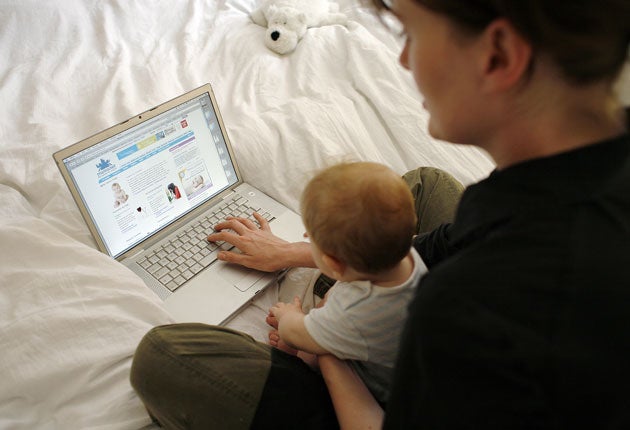New mothers shun the NHS and log on to swap baby tips
Few new mothers trust official advice on childrearing, and they're turning to chatrooms and family for help

It is billed as the greatest of life's journeys, yet the pressures of new motherhood mean that only about half of all mums find the experience "rewarding or exciting". The early days of parenting are, according to a new survey, blighted by the curse of our age: information overload.
With so much conflicting guidance, new mothers are shunning official medical advice, only 3 per cent putting their faith in anything the Government or the Department of Health has to tell them. Only one in four says she trusts the information provided by her health visitor, midwife or GP, leaving family members, friends or chatroom contacts to pick up the slack.
When it comes to coping with sleepless nights, problems with breastfeeding, or getting their baby into a routine, nearly three-quarters of mums aged 18 to 24 said they had found solace online. Josie George, mum to 15-month-old Kai, said she found her various health visitors' opinions "well-meaning but useless", and that the conflicting advice they had offered about her son's sleeping problems had been "overwhelming and very confusing".
She added: "The only place I've ever found any help is online, from people who have been through the same situation. [Online] you have the ability to connect with people who aren't just giving you their opinion but are sharing their experience."
Mummy blogs, such as Ms George's Sleep is for the Weak, are an increasingly popular source of support for new parents, along with advice from fellow stressed-out mothers in internet chatrooms on websites such as Netmums and Mumsnet.
The survey of 1,150 mums, by the baby product manufacturer Philips Avent, singled out lack of sleep as by far the biggest concern in early parenthood, followed by breastfeeding. More than one-third said confusing advice, particularly about feeding and sleeping routines, had marred their experience of becoming a parent.
Maria Miller, the Conservative spokeswoman for the family, said parents had become "more sceptical" about the advice they received from professionals because of incidents such as the furore over the MMR inoculation. Ms Miller said a "trust gap" existed between families and the state that she hoped to plug by getting voluntary organisations such as the National Childbirth Trust (NCT) and Home-Start to help run schemes such as the Government's Sure Start project, which provides support for families with children under five.
She said organisations such as the NCT could provide an "antidote to existing cynicism", offering new parents more support. She has also pledged to increase the number of health visitors offering "intensive support" for couples with young children.
Vicki Scott, a midwife who counsels Philips Avent, said the quality of advice provided by health professionals had deteriorated. "Midwives don't have time to understand problems before dispensing advice," she said.
Join our commenting forum
Join thought-provoking conversations, follow other Independent readers and see their replies
Comments